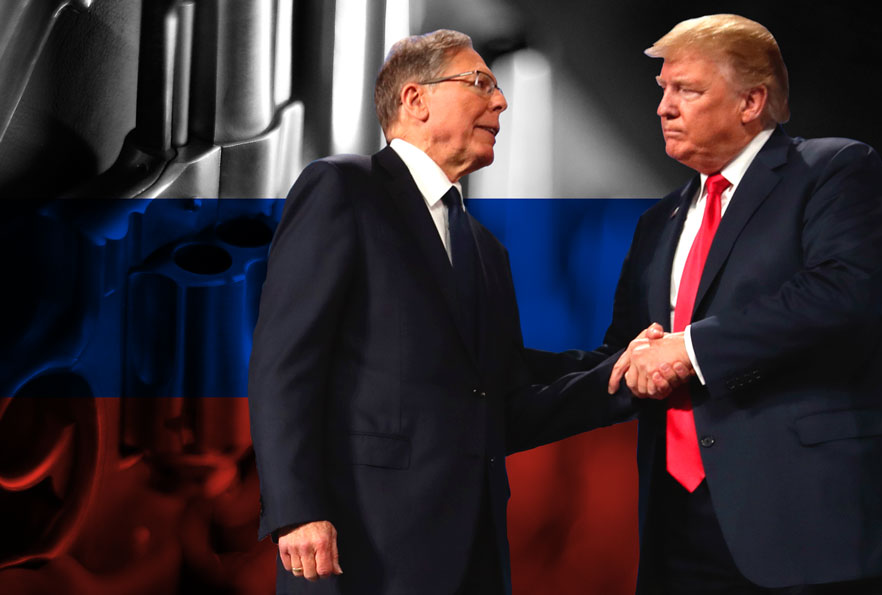The National Rifle Association acted as a “foreign asset” for Russia leading up to the 2016 election, according to a report by Democrats on the Senate Finance Committee.
An 18-month investigation into the NRA’s Russia ties by the committee’s minority staff, which reviewed more than 4,000 pages of NRA records, found that NRA leaders promised Russians access to U.S. officials in exchange for Russian business.
The probe found that NRA officials used the organization’s financial resources, which largely come from member dues, to curry favor with Aleksander Torshin, who was then an official at Russia’s Central Bank, and his deputy, convicted Russian spy Maria Butina.
The investigation found that former NRA president David Keene organized a trip to Russia — despite NRA denials that the trip was officially endorsed by the group — during which Butina and Torshin brought a delegation of NRA officials to Moscow. Keene set up the trip on the promise of business opportunities in Russia, including possible deals with a Russian gun manufacturer that was under U.S. sanctions, according to the report.
Getting the trip launched and approved took some convincing from Keene and his wife, Donna. Writing to then-NRA president Allan Cors about his decision to skip the trip, Donna Keene wrote, “we’ve worked for 7 years to build trust with the Russians.”
Along with the trip, the probe found that the NRA gave Torshin and Butina “broad access to events” over three years, where both Russians met with top Republican lawmakers and presidential candidates. Pete Brownell, an NRA official who went on the Moscow trip, told investigators that he personally introduced Butina to Donald Trump Jr. at a 2016 event. The report also showed that the NRA in August 2015 hosted then-Russian ambassador Sergei Kislyak, who became a central figure in the investigation into the Trump campaign’s ties to Russia.
Sen. Ron Wyden, D-Ore., the Finance Committee’s ranking member, said that the probe revealed that Torshin and Butina had “effectively used the promise of lucrative personal business opportunities to capture the NRA and gain access to the American political system.”
“This report lays out in significant detail that the NRA lied about the 2015 delegation trip to Moscow. This was an official trip undertaken so NRA insiders could get rich — a clear violation of the principle that tax-exempt resources should not be used for personal benefit,” Wyden said in a statement.
The report could have significant legal implications for the tax-exempt group, Senate Minority Leader Chuck Schumer said in a statement.
“The NRA has abused its tax-exempt status and essentially become a business enterprise that its board members and leadership use for lucrative personal business opportunities, including in Moscow,” he said. “As the disturbing truth continues to surface, the NRA’s status as a tax exempt entity needs to be thoroughly investigated.”
Republicans disagreed with the Democratic conclusions and issued their own report, arguing that the $6,000 raised for the trip to Russia was “relatively insubstantial” and argued that the rest of the evidence in the report “does not raise concerns that the NRA abused its tax-exempt status.”
“The Minority report reads more like a political document directed at an organization well known in U.S. politics to be despised by Democrats for its advocacy for Second Amendment rights,” the Republican report said.
But the $6,000 figure refers only to money the NRA reimbursed to Butina. The report also showed that Brownell had been reimbursed more than $21,000 by the NRA for expenses related to the trip. Only after questions were raised about the trip in 2018 did Brownell pay back $17,000 of those funds.
The investigation concluded that top NRA officials went to Russia “primarily or solely for the purpose of advancing personal business interests, rather than advancing the NRA’s tax-exempt purpose.”
Wyden did not explicitly call for the NRA to lose its tax-exempt status but said the IRS needed to conduct a “broader review of the NRA’s activities in recent years” to determine whether its activities in Russia were part of a “persistent pattern of impermissible conduct.”
“The totality of evidence uncovered during my investigation, as well as the mounting evidence of rampant self-dealing, indicate the NRA may have violated tax laws,” he said.
Attorneys general in New York and Washington, D.C., are conducting their own investigations of alleged wrongdoing by the NRA, which has been locked in a fierce legal battle with its longtime PR firm and a bizarre internal rift that has led to numerous resignations.
Butina pleaded guilty to acting as a Russian agent and was sentenced to 18 months in prison earlier this year.
During the NRA’s 2016 outreach to the Russians, an arm of the group that is not required to disclose its donors spent a record $30 million helping to elect President Trump, more than three times as much as it spent supporting Republican nominee Mitt Romney in 2012.


